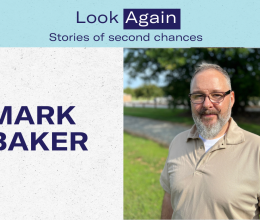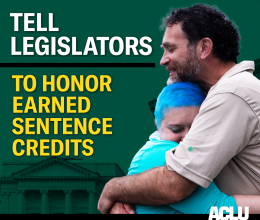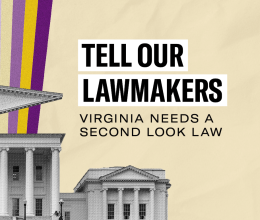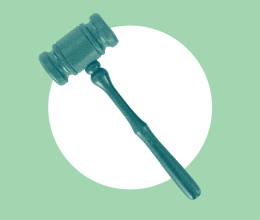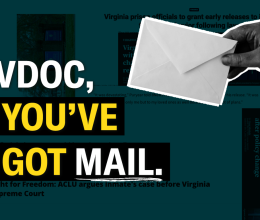
UPDATE: On 7/13/2023, Steven Prease was released from prison and reunited with his family, following the Supreme Court of Virginia's ruling that finds VADOC unlawfully keeping Steven Prease in prison. If you believe that your earned sentence credits were incorrectly withheld, here's what you should know.
ACLU of Virginia argued before the Virginia Supreme Court on June 7, 2023 about earned sentence credits.
The question we asked the Virginia Supreme Court to answer is this: do people who have convictions for certain attempts, conspiracies, or solicitations get to earn additional sentence credits, or not?
What this case about?
The earned sentence credit program is a way for people serving time on felony convictions to earn time off their sentences while they’re in the custody of the Virginia Department of Corrections (VADOC).
In 2020, Virginia’s legislature changed the earned sentence credit program to give people who demonstrate good behavior and who work to rehabilitate themselves a way to earn more time off to come home earlier.
But the statute was very clear that some convictions would not be eligible to earn those additional credits, and that people with such convictions would continue earning credits at the old rate for the time they served on them. You can find which convictions they said were ineligible here.
Some of the convictions that lawmakers named as ineligible are what’s called “inchoate offenses,” which is the legal term for attempt, solicitation, and conspiracy.
But VADOC has chosen to withhold earned sentence credits from people convicted of any inchoate offense related to one of the ineligible offenses (that is, an attempt, solicitation, or conspiracy to commit one of the ineligible offenses).
We think this is contrary to both the letter and the intent of the law, so we sued.
What are we asking the Supreme Court of Virginia to do?
We brought our lawsuit on behalf of one man, Mr. Steven Prease, who should have been released last summer thanks to the earned sentence credits he earned in prison.
We’re asking the Supreme Court of Virginia to send Mr. Prease home immediately. When we argued before the Court, we explained that VADOC’s faulty interpretation of the earned sentence credit lawmakers passed in 2020 is based on a 2022 advisory opinion by Attorney General Miyares.
AG Miyares’s opinion reconsidered an opinion by former Attorney General Herring, which had concluded that most inchoate offenses should be eligible for additional sentence credits.
We explained to the Court that the Herring opinion came to the correct legal conclusion, and that VADOC was wrong to follow the Miyares opinion.
In Mr. Prease’s case, the conviction he has for attempted aggravated murder is not listed as one of the convictions that are ineligible for additional sentence credits.
If the Virginia Supreme Court agrees with us, Mr. Prease will have earned enough sentence credits to go home immediately.
What about everyone else?
Not everyone in prison will be impacted by the outcome of Mr. Prease’s case.
In fact, only people who have convictions for attempt, conspiracy, or solicitation to commit one of the crimes listed in Va. Code § 53.1-202.3 and are serving time for those convictions (not just a suspended sentence) could be impacted.
But Mr. Prease’s case isn’t the only case we’ve filed on behalf of people whose earned sentence credits VADOC is withholding.
We have a second case before the Virginia Supreme Court that deals with a provision that was put into Virginia’s budget bill in June 2022.
Our client in that case is Mr. Antoine Anderson, who VADOC is denying the sentence credits he earned while he was incarcerated for a different reason than it is denying Mr. Prease’s credits.
Mr. Anderson has two kinds of convictions. One is eligible for earned sentence credits, and the other one isn’t.
In Mr. Anderson’s case, the provision that Governor Youngkin’s administration included in the 2022 state budget says that as long as someone has one ineligible conviction, they cannot earn credits on any of their convictions (even the eligible ones), if the sentences for the convictions run concurrent or consecutive to one another.
But the provision in the budget doesn’t say that the new rule should apply retroactively, or in other words, to the time served before the budget went into effect on July 1, 2022.
We believe that people like Mr. Anderson – who has a conviction that is eligible to earn sentence credits – should have the hard work he did before the new rule went into effect honored.
That’s not what VADOC has chosen to do. Instead, VADOC says the new rule wipes the slate clean and erases all the hard work Mr. Anderson already did.
So we sued. And the Supreme Court of Virginia has decided to hear argument on Mr. Anderson’s case in September 2023.
When will we know what happens next?
We don’t know when we’ll get a decision from the Court in either of these cases.
If we win either or both of these cases, we’ll push VADOC to apply those rulings to everyone in custody by recalculating sentence credits for anyone with eligible convictions.
If you think either of these cases might affect you, you should check with a lawyer to see how.
We’ll let you know as soon as we hear something!
The information provided on this website is not legal advice and is provided for informational purposes only. Information on this website may not be up to date, and readers are advised to contact their attorney for advice on any particular legal matter.
